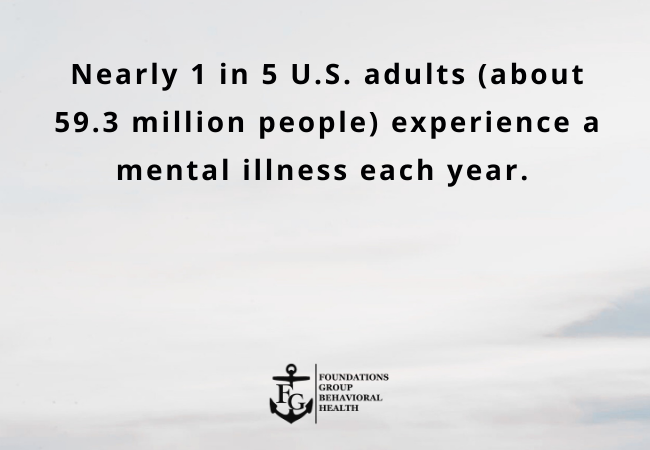When you’re facing the challenges of anxiety, depression, trauma, or other mental health disorders, deciding on the right treatment path can feel overwhelming. One of the most common questions we hear at Foundations Group Behavioral Health is: “Should I take psychiatric medication, go to therapy, or try both?”
It’s a very important — and deeply personal — question. And the answer is: it depends on your unique needs.
The good news is that you don’t have to figure it out alone. Our experienced team offers comprehensive care options, from Psychiatric Day Treatment Massachusetts to Outpatient Mental Health Therapy Massachusetts, and we’re here to guide you toward the most effective, individualized treatment plan.
In this article, we’ll break down the differences between psychiatric medication and therapy, explore their benefits, limitations, and how they work together. By the end, you’ll have a clear understanding of your options — and feel empowered to take the next step.
Understanding Psychiatric Medications
Psychiatric medications play an essential role in managing the biological aspects of mental health conditions. These medications work by targeting the brain’s neurotransmitters — the chemical messengers that regulate mood, anxiety, and behavior.
When Are Psychiatric Medications Used?
Medication can be especially helpful when:
- Symptoms are severe or disabling, interfering with daily activities like work, school, or relationships.
- A person is experiencing persistent sadness, anxiety, or mood swings that make it difficult to engage in therapy or other healing activities.
- There is a need for stabilization, especially for people with trauma-related disorders or co-occurring substance use conditions.
- Quick relief from acute distress is necessary to prevent crisis escalation.
At Foundations Group Behavioral Health, medication management is an integral part of our Mental Health Treatment Programs Massachusetts. We provide expert prescribing and monitoring across all levels of care, from Psychiatric Day Treatment Massachusetts to Half Day Treatment Program Massachusetts.
Types of Medications Commonly Used:
- Antidepressants (SSRIs, SNRIs, etc.) for depression and anxiety.
- Anti-anxiety medications, often prescribed for panic disorders and severe anxiety.
- Mood stabilizers for emotional regulation, especially in Trauma Disorder Treatment Program Massachusetts.
- Antipsychotics for complex mood disorders or psychosis.
Benefits of Medication:
- Can provide symptom relief in a relatively short time (depending on the medication).
- Reduces emotional distress, making therapy more accessible and effective.
- Particularly helpful for biological or severe mental health conditions.
Considerations:
- Medication typically requires ongoing monitoring to adjust dosages and manage side effects.
- Medications manage symptoms but do not address emotional roots or learned behaviors associated with mental health conditions.
Understanding Mental Health Therapy
While medication treats the biological aspects of mental illness, therapy addresses the emotional, psychological, and behavioral layers. Therapy helps people process experiences, develop healthier thinking patterns, and build coping strategies that last a lifetime.
When Is Therapy Most Helpful?
Therapy is effective for:
- Mild to moderate symptoms, especially early in the condition.
- People who want to explore and heal the root causes of their emotional distress.
- Learning coping skills to manage triggers and prevent relapse.
- Enhancing self-awareness and building resilience.
At Foundations Group Behavioral Health, we offer diverse therapy modalities through Outpatient Mental Health Therapy Massachusetts, Half Day Treatment Program Massachusetts, and as part of our intensive Psychiatric Day Treatment Massachusetts.
Therapies We Use:
- Cognitive Behavioral Therapy (CBT) — Focuses on changing unhelpful thoughts and behaviors.
- Trauma-Informed Therapy — Central to our Trauma Disorder Treatment Program Massachusetts.
- Dialectical Behavior Therapy (DBT) — Ideal for emotional regulation and distress tolerance.
- Mindfulness and Relaxation Techniques — Helps manage symptoms like anxiety and depression.
Benefits of Therapy:
- Addresses the root causes of mental health challenges.
- Helps build coping mechanisms for long-term stability.
- Enhances relationships, self-esteem, and emotional resilience.
- No physical side effects.
Considerations:
- Progress can be gradual, especially for long-standing or severe issues.
- Requires active participation and emotional work.
- In cases of acute distress, therapy alone may not be sufficient at first.
The Power of Combining Medication and Therapy
When used together, medication and therapy complement each other beautifully.
- Medication reduces symptoms, making it easier to engage meaningfully in therapy.
- Therapy equips individuals with life skills, helping them manage symptoms and life stressors in the long term.
- For conditions like major depression, anxiety disorders, PTSD, and co-occurring disorders, research consistently shows that combination treatment is more effective than either approach alone.
At Foundations Group Behavioral Health, we strongly advocate for integrated care. In our Behavioral Health Treatment Center Massachusetts, patients receive coordinated services that bring the best of both worlds together.

What Science Says: Medication + Therapy for Better Outcomes
Clinical research supports combination treatment:
- Studies have found that combining therapy and medication doubles the chance of recovery in cases of moderate to severe depression.
- For anxiety disorders, combined treatment helps reduce relapse rates significantly compared to medication alone.
- Patients with trauma histories benefit from medication to stabilize symptoms while therapy addresses the emotional aftermath.
This is why our programs — including Psychiatric Day Treatment Massachusetts, Half Day Treatment Program Massachusetts, and Outpatient Mental Health Therapy Massachusetts — are built around integrated models of care.
How to Know What’s Right for You
Deciding whether you need medication, therapy, or both depends on your unique circumstances. Here are some guiding questions:
- Are your symptoms so severe that they interfere with daily living or safety?
→ Consider starting with medication and adding therapy. - Do you feel ready to process emotions and work through challenges with support?
→ Therapy might be an excellent starting point. - Have you tried one approach before without full relief?
→ Combination treatment could offer a more complete path forward. - Are you seeking structured, comprehensive care in a safe environment?
→ Explore our Psychiatric Day Treatment Massachusetts or Half Day Treatment Program Massachusetts for integrated support.
At Foundations Group Behavioral Health, we never make treatment decisions for you — we make them with you. Through collaborative assessments and compassionate conversations, we build a care plan that respects your preferences, needs, and goals.
Why Choose Foundations Group Behavioral Health
At Foundations Group Behavioral Health, we believe that healing is not one-size-fits-all. We meet you exactly where you are, providing compassionate, customized care that addresses both the biological and emotional aspects of mental health recovery.
Here’s why individuals across Massachusetts trust us with their mental wellness:
- Integrated, Evidence-Based Care
We combine the best of psychiatric medication management with proven therapeutic approaches, ensuring you receive complete, whole-person treatment. - Multiple Levels of Support
Whether you need intensive daily care through our Psychiatric Day Treatment Massachusetts, flexibility with our Half Day Treatment Program Massachusetts, or ongoing guidance in our Outpatient Mental Health Therapy Massachusetts, we have a program that fits your life. - Specialized Programs for Complex Conditions
From our Depressive Disorder Treatment Program Massachusetts to our Trauma Disorder Treatment Program Massachusetts, we offer targeted support for a wide range of mental health conditions. - Experienced, Compassionate Professionals
Our team of licensed psychiatrists, therapists, and counselors provides expert care in a warm, respectful environment at our Behavioral Health Treatment Center Massachusetts. - Your Care, Your Voice
We work with you to create a personalized plan that aligns with your goals, values, and preferences. You’ll never feel like just a number — you’ll feel seen, heard, and supported.
Conclusion
The path to mental wellness isn’t linear, and it isn’t identical for everyone. Some find success with therapy alone, others with medication, and many experience the best outcomes with both. The essential thing is choosing a path forward — and having the right support along the way.
At Foundations Group Behavioral Health, we’re here to guide you every step of the way. Whether you need the stability of our Psychiatric Day Treatment Massachusetts, the flexibility of our Half Day Treatment Program Massachusetts, or the ongoing support of Outpatient Mental Health Therapy Massachusetts, we offer personalized, integrated care designed around you.
Don’t wait to find clarity and relief. Call us today at 888.685.9730 and let us help you build a treatment plan that leads to a healthier, more hopeful future. Your journey to healing starts with a single, empowered step — and we’re honored to walk alongside you.
FAQ on Psychiatric Meds vs. Therapy
Can therapy alone be effective without medication?
Yes, for many people with mild to moderate symptoms, therapy alone can be very effective. Therapy helps address the root causes of emotional distress and equips individuals with coping skills. Our Outpatient Mental Health Therapy Massachusetts is designed to support this approach.
When is medication necessary for mental health treatment?
Medication may be necessary when symptoms are severe, disabling, or unmanageable with therapy alone. For conditions like major depression, severe anxiety, or mood disorders, medication can provide crucial stabilization, especially in our Psychiatric Day Treatment Massachusetts program.
How do medication and therapy work together?
Medication helps reduce symptoms, while therapy works on emotional healing and coping strategies. The combination offers both short-term relief and long-term recovery tools, which is why we integrate both in our Half Day Treatment Program Massachusetts and Behavioral Health Treatment Center Massachusetts.
Are there side effects with psychiatric medication?
Some people experience mild side effects, especially at the beginning of treatment. Our providers monitor your progress closely and adjust medications as needed to minimize side effects.
What types of therapy do you offer at Foundations Group Behavioral Health?
We offer Cognitive Behavioral Therapy (CBT), Trauma-Informed Therapy, Mindfulness-Based Therapies, and Group Therapy, among others, as part of our Mental Health Treatment Programs Massachusetts.
Can I start therapy and add medication later if needed?
Absolutely. Many people begin with therapy and later add medication for additional support. We continuously assess your progress and make recommendations that align with your goals.
What’s included in the Psychiatric Day Treatment program?
Our Psychiatric Day Treatment Massachusetts program includes daily structured therapy sessions, medication management, group therapy, and personalized care planning for comprehensive support.








